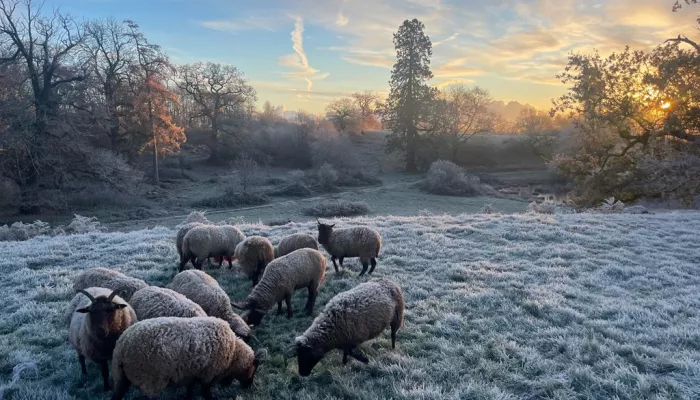Staff and volunteers at Kent Wildlife Trust braved sub-zero temperatures this morning, Monday 12th December, to ensure the animals grazing over the charity’s nature reserves were thriving in the frosty conditions.
Extra feed was scattered, the ice was broken on the water troughs and welfare checks were conducted as the staff and volunteers carefully made their way around the reserves, some of whom made a considerable effort to reach in the conditions.
Alison Ruyter, Area Manager for Kent Wildlife Trust said: “I would like to thank everyone who went out in difficult conditions to carry out livestock checks this morning. They have worked hard carrying extra feed and walking a long way in the snow to make sure the animals are accounted for and doing well.
“The animals all appear to be non-plussed about the snowy conditions, but did however appear to enjoy the extra food!”
The charity manages around 700 animals who graze on around 50 reserves in the county. The water buffalo, cattle, pigs, ponies, sheep, goats and bison play a pivotal role in creating wildlife rich habitats and minimising human intervention.
Matching the animal to the specific landscape needs, they act in similar ways to larger grazing animals that used to live wild in Kent but are now extinct, such as auroch, elk and steppe bison. For example, the pigs graze, browse and consume berries and fungi, and have been known to take invertebrates which helps to create and maintain a mosaic of bare ground, herb rich pasture and shrub layer. Their rootling can clear dense ground vegetation such as bracken, reducing the need for weed control and creating seed beds for natural regeneration.
The bison have unique behaviours, debarking trees which creates standing deadwood for invertebrates, bats and other wildlife. They also dustbathe forming the perfect environment for burrowing insects.
The use of the conservation grazers helps to tackle the biodiversity crises being experienced globally an issue currently being discussed at COP15 in Canada.
The UK is one of the most nature-depleted countries in the world – and in Kent, wildlife has suffered over recent decades from poorly planned developments and pollution in our rivers and seas. Whilst Kent Wildlife Trust is fighting back with projects like Wilder Blean, the reintroduction of the red-billed chough and establishing a network of wild grazing animals, the charity is calling on the UK government to do more to protect nature.

